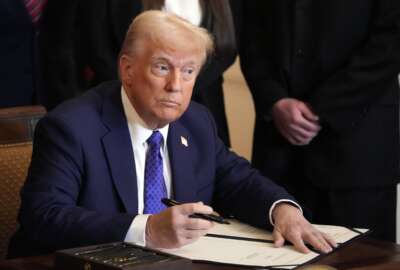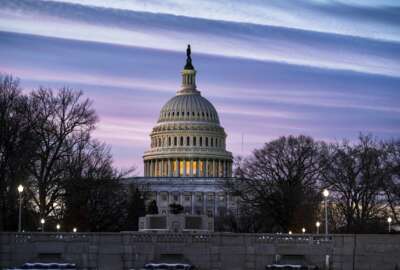Lawmakers seek a better presidential transition
The recent presidential transition from the Bush to Obama Administrations has been called one of the best in history. But lawmakers are considering legislation that...
wfedstaff | June 3, 2015 1:06 am
By Max Cacas
Reporter
Federal News Radio
Next week, the Senate Homeland Security and Governmental Affairs Committee will take up legislation designed to streamline the next Presidential transition. The bill will be based, in part, on testimony provided at a hearing on the subject of transition held yesterday.
Hawaii Senator Daniel Akaka (D.), chair of the Senate Subcommittee on the Oversight of Government Management (part of the Homeland Security and Governmental Affairs panel), says that all told, the transition from Bush 43 to Obama 44 went about as well as anyone expected:
Today, 15 months after President Obama was sworn into office, I am pleased to say that it appears that this early planning and preparation laid the groundwork for a smooth transition. Although some problems were revealed, I believe this was one of the most successful transfers of power to date. Beginning well before the election, the Bush administration ordered agencies to identify career individuals to take on leadership roles while political appointees left the administration. This would ensure management continuity in critical areas until new people were appointed and brought up to speed. In addition, the Obama campaign took advantage of provisions in the Intelligence Reform and Terrorism Prevention Act, which allowed advance security clearances for individuals who were to work in the transition or later in the administration.
But some lawmakers feel that they can make future presidential transitions even better. One is Delware Senator Ted Kaufman, who has introduced S. 3196: “The Pre-election Presidential Transition Act”, co-sponsored by Chairman Akaka; Ohio Republican George Voinovich, ranking member of the subcommittee; and Connecticut Democrat Joe Lieberman, chairman of the full Homeland Security Committee.
“It will help make transitions smoother, on both sides,” Kaufman told the subcommittee in an opening statement. “For incoming administrations, early planning is vital. That’s why my bill extends certain government provided services and resources to major party nominees and third-party candidates, to begin transition planning before election day.”
Kaufman also says his bill will mandate a process for outgoing administrations modeled upon the actions of the Bush 43 administration.
Thursday’s hearing addressed a number of issues surrounding the transition, among them, the cost of the transition; federal budget issues, and the transfer of power during times of economic upheaval and security threats. Also: identifying the most important members of the President-elect’s team, and having them cleared and confirmed by Inauguration day.
But one issue that took up a good deal of the nearly two-hour hearing dealt with a problem that persists to this day – Senate confirmation of other top-level appointees.
Max Stier, president of the Partnership for Public Service:
It would make this process easier if there were fewer political appointees. There are political appointees of different stripes. There are management positions, there are assistant secretaries for public affairs, but do they really need to be PASs? If you reduce the number, you clear away a lot of the activity that needs to take place, and it will insure that the new political team actually has some critical positions filled early on when they need them.
Senator Kaufman comes to this discussion with a unique perspective. Before he was appointed to fill out the remainder of now-Vice President Biden’s senate term, he was an advisor on the Obama transition team. Kaufman notes that White House officials cling to the notion of needing more — not less — political appointees who need the blessing of the Senate.
“I’ve talked about this with people in administrations, and they say, ‘if you’re not confirmable, you don’t have as much swack because you’re not in a confirmable position.’ Why should a legislative affairs person be a confirmable position?”
For some perspective, Federal News Radio spoke to ranking member Voinovich, a long-time veteran of presidential transitions — and the United States Senate, from which he will be retiring at the end of this year.
Well, there’s no question that if you sat down and really went through all of the people that are required to be confirmed by the Senate, that logic and common sense would say many of them ought not be confirmed by the Senate, because they don’t rise to the position of something that would require Senate confirmation. The problem here is that several years ago, we tried to do this, and many Senators are very jealous of having all these folks come before them and go through the process, et cetera.
Voinovich goes on to say that many of the “authorization” committees of the Senate, which are responsible for helping legislate governmental policy and oversight, are generally “wasting their time confirming people who don’t need to be confirmed.” The large number of political appointees requiring confirmation also creates huge backlogs that can be exacerbated by continued political wrangling over un-related subjects.
Right-sizing the number of Senate-confirmed political appointees is expected to be one of the topics discussed when the transition bill is marked up in the full Senate Homeland Security and Governmental Affairs committee next week.
——
Related links:
Transition Hearing webpage (4/22/10)
(Copyright 2010 by FederalNewsRadio.com. All Rights Reserved.)
Copyright © 2025 Federal News Network. All rights reserved. This website is not intended for users located within the European Economic Area.





